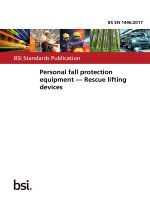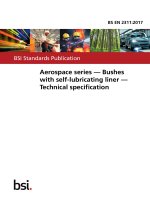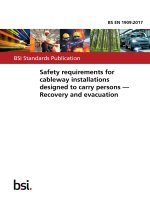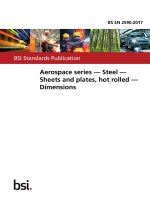Bsi bs en 00566 2017
Bạn đang xem bản rút gọn của tài liệu. Xem và tải ngay bản đầy đủ của tài liệu tại đây (1.74 MB, 16 trang )
BS EN 566:2017
BSI Standards Publication
Mountaineering equipment —
Slings — Safety requirements
and test methods
BS EN 566:2017
BRITISH STANDARD
National foreword
This British Standard is the UK implementation of EN 566:2017.
It supersedes BS EN 566:2006 which is withdrawn.
The UK participation in its preparation was entrusted to Technical
Committee SW/136/5, Sports, Playground and other Recreational
Equipment - Mountaineering Equipment.
A list of organizations represented on this committee can be
obtained on request to its secretary.
This publication does not purport to include all the necessary
provisions of a contract. Users are responsible for its correct
application.
© The British Standards Institution 2017.
Published by BSI Standards Limited 2017
ISBN 978 0 580 87326 3
ICS 97.220.40
Compliance with a British Standard cannot confer immunity from
legal obligations.
This British Standard was published under the authority of the
Standards Policy and Strategy Committee on 31 March 2017.
Amendments/corrigenda issued since publication
Date
Text affected
BS EN 566:2017
EN 566
EUROPEAN STANDARD
NORME EUROPÉENNE
EUROPÄISCHE NORM
March 2017
ICS 97.220.40
Supersedes EN 566:2006
English Version
Mountaineering equipment - Slings - Safety requirements
and test methods
Équipement d'alpinisme et d'escalade - Anneaux Exigences de sécurité et méthodes d'essai
Bergsteigerausrüstung - Schlingen Sicherheitstechnische Anforderungen und
Prüfverfahren
This European Standard was approved by CEN on 16 January 2017.
CEN members are bound to comply with the CEN/CENELEC Internal Regulations which stipulate the conditions for giving this
European Standard the status of a national standard without any alteration. Up-to-date lists and bibliographical references
concerning such national standards may be obtained on application to the CEN-CENELEC Management Centre or to any CEN
member.
This European Standard exists in three official versions (English, French, German). A version in any other language made by
translation under the responsibility of a CEN member into its own language and notified to the CEN-CENELEC Management
Centre has the same status as the official versions.
CEN members are the national standards bodies of Austria, Belgium, Bulgaria, Croatia, Cyprus, Czech Republic, Denmark, Estonia,
Finland, Former Yugoslav Republic of Macedonia, France, Germany, Greece, Hungary, Iceland, Ireland, Italy, Latvia, Lithuania,
Luxembourg, Malta, Netherlands, Norway, Poland, Portugal, Romania, Serbia, Slovakia, Slovenia, Spain, Sweden, Switzerland,
Turkey and United Kingdom.
EUROPEAN COMMITTEE FOR STANDARDIZATION
COMITÉ EUROPÉEN DE NORMALISATION
EUROPÄISCHES KOMITEE FÜR NORMUNG
CEN-CENELEC Management Centre: Avenue Marnix 17, B-1000 Brussels
© 2017 CEN
All rights of exploitation in any form and by any means reserved
worldwide for CEN national Members.
Ref. No. EN 566:2017 E
BS EN 566:2017
EN 566:2017 (E)
Contents
Page
European foreword....................................................................................................................................................... 3
Introduction .................................................................................................................................................................... 4
1
Scope .................................................................................................................................................................... 5
2
Terms and definitions ................................................................................................................................... 5
3
3.1
3.2
3.3
Safety requirements ....................................................................................................................................... 5
Stability ............................................................................................................................................................... 5
Stitching .............................................................................................................................................................. 5
Tensile strength ............................................................................................................................................... 5
4
4.1
4.1.1
4.1.2
4.2
4.3
4.3.1
4.3.2
4.3.3
Test methods .................................................................................................................................................... 6
Stability ............................................................................................................................................................... 6
Preparation ....................................................................................................................................................... 6
Test ....................................................................................................................................................................... 6
Stitching .............................................................................................................................................................. 6
Tensile strength ............................................................................................................................................... 6
Test sample ....................................................................................................................................................... 6
Conditioning and test conditions .............................................................................................................. 7
Determination of tensile strength............................................................................................................. 7
5
Marking ............................................................................................................................................................... 7
6
Information supplied by the manufacturer........................................................................................... 7
Annex A (informative) Standards on mountaineering equipment ............................................................ 9
Annex ZA (informative) Relationship between this European Standard and the essential
requirements of Directive 89/686/EEC aimed to be covered ..................................................... 11
2
BS EN 566:2017
EN 566:2017 (E)
European foreword
This document (EN 566:2017) has been prepared by Technical Committee CEN/TC 136 “Sports,
playground and other recreational facilities and equipment”, the secretariat of which is held by DIN.
This European Standard shall be given the status of a national standard, either by publication of an
identical text or by endorsement, at the latest by September 2017, and conflicting national standards
shall be withdrawn at the latest by September 2017.
Attention is drawn to the possibility that some of the elements of this document may be the subject of
patent rights. CEN shall not be held responsible for identifying any or all such patent rights.
This document supersedes EN 566:2006.
This document has been prepared under a mandate given to CEN by the European Commission and the
European Free Trade Association, and supports essential requirements of EU Directive.
For relationship with EU Directive, see informative Annex ZA, which is an integral part of this
document.
In relation to EN 566:2006 the following main amendments have been made:
a) requirements and test method for the stability test modified;
b) test conditions modified.
According to the CEN-CENELEC Internal Regulations, the national standards organisations of the
following countries are bound to implement this European Standard: Austria, Belgium, Bulgaria,
Croatia, Cyprus, Czech Republic, Denmark, Estonia, Finland, Former Yugoslav Republic of Macedonia,
France, Germany, Greece, Hungary, Iceland, Ireland, Italy, Latvia, Lithuania, Luxembourg, Malta,
Netherlands, Norway, Poland, Portugal, Romania, Serbia, Slovakia, Slovenia, Spain, Sweden, Switzerland,
Turkey and the United Kingdom.
3
BS EN 566:2017
EN 566:2017 (E)
Introduction
The text of this European standard is based on the former UIAA-Standard J (Union Internationale des
Associations d'Alpinisme), which has been developed with international participation.
This European standard is one of a package of standards for mountaineering equipment, see Annex A.
4
BS EN 566:2017
EN 566:2017 (E)
1 Scope
This European standard specifies safety requirements and test methods for slings used for
mountaineering including climbing.
2 Terms and definitions
For the purposes of this document, the following term and definition applies.
2.1
sling
tape, accessory cord or rope joined together by stitching or other means of fastening, whose shape and
length are not specified to link other items in safety systems
Note 1 to entry:
Examples of construction of slings are illustrated in Figure 1.
Figure 1 — Examples of construction
3 Safety requirements
3.1 Stability
When a woven tape is used, the weft yarn of the tape shall not unravel when tested in accordance with
4.1.
3.2 Stitching
Where stitching is used to provide safety and strength (e.g. in joints) it shall be possible to inspect it and
the stitching shall contrast with the tape in colour or surface appearance.
3.3 Tensile strength
When tested in accordance with 4.3, the tensile strength shall be at least 22 kN.
5
BS EN 566:2017
EN 566:2017 (E)
4 Test methods
4.1 Stability
4.1.1 Preparation
Cut a sample of at least 200 mm in length of the woven tape from the sling without the influence of heat.
Extract the weft yarns on both ends of the sample to allow the attachment of a test mass of 150 g ± 5 g
(see Figure 2).
Key
1 clamp
2 tape
3 warp yarns
4 weft yarns
M M = 150 g ± 5 g
Figure 2 — Test method for stability
4.1.2 Test
Fix the test sample vertically. Apply, without shock, the mass to the weft yarn of the lower end of the
test sample for at least 1 min. Release the mass and check whether or not the weft yarn has unravelled.
Repeat the test on the weft yarn of the other end of the test sample.
4.2 Stitching
Carry out a visual examination to check that the requirements specified in 3.2 are met.
4.3 Tensile strength
4.3.1 Test sample
One sample of the shortest length of the sling type shall be tested.
The test shall always be carried out on an unused test sample.
6
BS EN 566:2017
EN 566:2017 (E)
4.3.2 Conditioning and test conditions
Dry the test samples for at least 24 h in an atmosphere of (50 ± 5) °C and less than 20 % relative
humidity. Then condition these test samples in an atmosphere of (23 ± 2) °C and (50 ± 2) % relative
humidity for at least 72 h. Then start testing these samples at a temperature of (23 ± 5) °C within 10
min.
4.3.3 Determination of tensile strength
Attach the test sample between two bars offering a contact radius of (5 ± 0,05) mm to the sling and with
a mean roughness value, Ra, not exceeding 0,8 μm and a peak to valley height, Rmax, not exceeding
6,3 μm.
Determine the loading speed, v, as a function of the free length of the test sample, using Formula (1):
v
=±
( 0,5 0,1) / min × l
where
v
l
(1)
is the loading speed in millimetres per minute;
is the free length in millimetres of the test sample overall laid out in the flat.
5 Marking
Slings shall be marked with at least the following items:
a) name of the manufacturer or its authorized representative;
b) tensile strength which the manufacturer ensures at the time of manufacturing;
c) number of this European Standard, i.e. EN 566;
d) year of manufacture.
6 Information supplied by the manufacturer
The sling shall be supplied with an explanatory leaflet, and written in at least the official language(s) of
the state of destination containing at least the following items:
a) name and address of the manufacturer or its authorized representative;
b) number of this European Standard, i.e. EN 566;
c) meaning of any marking on the product;
d) tensile strength which the manufacturer ensures at the time of manufacturing;
e) use of the product;
f) how to choose other components for use in the system;
g) how to maintain/service the product, on the effects of chemical reagents and how to clean the
product without adverse effect;
h) lifespan of the product and how to assess it and that after a serious fall the sling should be
withdrawn from use as soon as possible;
7
BS EN 566:2017
EN 566:2017 (E)
i) influence of wet and icy conditions;
j) danger of sharp edges;
k) influence of storage and aging due to use;
l) influence of knots on the strength.
8
BS EN 566:2017
EN 566:2017 (E)
Annex A
(informative)
Standards on mountaineering equipment
Table A.1 — List of standards on mountaineering equipment
No
Document
Title
1
EN 564
Mountaineering equipment — Accessory cord — Safety requirements and
test methods
3
EN 566
Mountaineering equipment — Slings — Safety requirements and test
methods
2
4
5
6
7
8
9
10
11
12
13
14
15
16
EN 565
EN 567
EN 568
EN 569
EN 892
EN 893
EN 958
EN 959
EN 12270
EN 12275
EN 12276
EN 12277
EN 12278
EN 12492
Mountaineering equipment — Tape — Safety requirements and test
methods
Mountaineering equipment — Rope clamps — Safety requirements and
test methods
Mountaineering equipment — Ice anchors — Safety requirements and test
methods
Mountaineering equipment — Pitons — Safety requirements and test
methods
Mountaineering equipment — Dynamic mountaineering ropes — Safety
requirements and test methods
Mountaineering equipment — Crampons — Safety requirements and test
methods
Mountaineering equipment — Energy absorbing systems for use in
klettersteig (via ferrata) climbing — Safety requirements and test methods
Mountaineering equipment — Rock anchors — Safety requirements and
test methods
Mountaineering equipment — Chocks — Safety requirements and test
methods
Mountaineering equipment — Connectors — Safety requirements and test
methods
Mountaineering equipment — Frictional anchors — Safety requirements
and test methods
Mountaineering equipment — Harnesses — Safety requirements and test
methods
Mountaineering equipment — Pulleys — Safety requirements and test
methods
Mountaineering equipment — Helmets for mountaineers — Safety
requirements and test methods
9
BS EN 566:2017
EN 566:2017 (E)
No
Document
Title
17
EN 13089
Mountaineering equipment — Ice-tools — Safety requirements and test
methods
19
EN 15151–2
Mountaineering equipment — Braking devices — Part 2: Manual braking
devices, safety requirements and test methods
18
20
21
10
EN 15151–1
FprEN 16716
prEN 16869
Mountaineering equipment — Braking devices — Part 1: Braking devices
with manually assisted locking, safety requirements and test methods
Mountaineering equipment —
requirements and test methods
Avalanche
Design/construction of Via Ferrata
airbag
systems —
Safety
BS EN 566:2017
EN 566:2017 (E)
Annex ZA
(informative)
Relationship between this European Standard and the essential
requirements of Directive 89/686/EEC aimed to be covered
This European Standard has been prepared under a Commission’s standardization request M/031
“Personal Protective Equipments” to provide one voluntary means of conforming to essential
requirements of Directive 89/686/EEC “Personal Protective Equipment”.
Once this standard is cited in the Official Journal of the European Union under that Directive,
compliance with the normative clauses of this standard given in Table ZA.1 confers, within the limits of
the scope of this standard, a presumption of conformity with the corresponding essential requirements
of that Directive and associated EFTA regulations.
Table ZA.1 — Correspondence between this European Standard and Article(s) of
Directive 89/686/EEC
Essential Requirements of Directive
89/686/EEC
1.2.1
Absence of risks and other factors
1.3.2
Lightness and design strength
1.4
Information supplied by the manufacturer
Clause(s)/subclause(s) of
this EN
Remarks/
Notes
3.1, 3.2
Only the first
paragraph
of
ER 1.2.1
is
applicable, not
1.2.1.1 to 1.2.1.3
3.3
5, 6
WARNING 1 — Presumption of conformity stays valid only as long as a reference to this European
Standard is maintained in the list published in the Official Journal of the European Union. Users of this
standard should consult frequently the latest list published in the Official Journal of the European
Union.
WARNING 2 — Other Union legislation may be applicable to the product(s) falling within the scope of
this standard.
11
This page deliberately left blank
This page deliberately left blank
NO COPYING WITHOUT BSI PERMISSION EXCEPT AS PERMITTED BY COPYRIGHT LAW
British Standards Institution (BSI)
BSI is the national body responsible for preparing British Standards and other
standards-related publications, information and services.
BSI is incorporated by Royal Charter. British Standards and other standardization
products are published by BSI Standards Limited.
About us
Reproducing extracts
We bring together business, industry, government, consumers, innovators
and others to shape their combined experience and expertise into standards
-based solutions.
For permission to reproduce content from BSI publications contact the BSI
Copyright & Licensing team.
The knowledge embodied in our standards has been carefully assembled in
a dependable format and refined through our open consultation process.
Organizations of all sizes and across all sectors choose standards to help
them achieve their goals.
Information on standards
We can provide you with the knowledge that your organization needs
to succeed. Find out more about British Standards by visiting our website at
bsigroup.com/standards or contacting our Customer Services team or
Knowledge Centre.
Buying standards
You can buy and download PDF versions of BSI publications, including British
and adopted European and international standards, through our website at
bsigroup.com/shop, where hard copies can also be purchased.
If you need international and foreign standards from other Standards Development
Organizations, hard copies can be ordered from our Customer Services team.
Copyright in BSI publications
All the content in BSI publications, including British Standards, is the property
of and copyrighted by BSI or some person or entity that owns copyright in the
information used (such as the international standardization bodies) and has
formally licensed such information to BSI for commercial publication and use.
Save for the provisions below, you may not transfer, share or disseminate any
portion of the standard to any other person. You may not adapt, distribute,
commercially exploit, or publicly display the standard or any portion thereof in any
manner whatsoever without BSI’s prior written consent.
Storing and using standards
Standards purchased in soft copy format:
• A British Standard purchased in soft copy format is licensed to a sole named
user for personal or internal company use only.
• The standard may be stored on more than 1 device provided that it is accessible
by the sole named user only and that only 1 copy is accessed at any one time.
• A single paper copy may be printed for personal or internal company use only.
Standards purchased in hard copy format:
• A British Standard purchased in hard copy format is for personal or internal
company use only.
• It may not be further reproduced – in any format – to create an additional copy.
This includes scanning of the document.
If you need more than 1 copy of the document, or if you wish to share the
document on an internal network, you can save money by choosing a subscription
product (see ‘Subscriptions’).
Subscriptions
Our range of subscription services are designed to make using standards
easier for you. For further information on our subscription products go to
bsigroup.com/subscriptions.
With British Standards Online (BSOL) you’ll have instant access to over 55,000
British and adopted European and international standards from your desktop.
It’s available 24/7 and is refreshed daily so you’ll always be up to date.
You can keep in touch with standards developments and receive substantial
discounts on the purchase price of standards, both in single copy and subscription
format, by becoming a BSI Subscribing Member.
PLUS is an updating service exclusive to BSI Subscribing Members. You will
automatically receive the latest hard copy of your standards when they’re
revised or replaced.
To find out more about becoming a BSI Subscribing Member and the benefits
of membership, please visit bsigroup.com/shop.
With a Multi-User Network Licence (MUNL) you are able to host standards
publications on your intranet. Licences can cover as few or as many users as you
wish. With updates supplied as soon as they’re available, you can be sure your
documentation is current. For further information, email
Revisions
Our British Standards and other publications are updated by amendment or revision.
We continually improve the quality of our products and services to benefit your
business. If you find an inaccuracy or ambiguity within a British Standard or other
BSI publication please inform the Knowledge Centre.
Useful Contacts
Customer Services
Tel: +44 345 086 9001
Email (orders):
Email (enquiries):
Subscriptions
Tel: +44 345 086 9001
Email:
Knowledge Centre
Tel: +44 20 8996 7004
Email:
Copyright & Licensing
Tel: +44 20 8996 7070
Email:
BSI Group Headquarters
389 Chiswick High Road London W4 4AL UK









